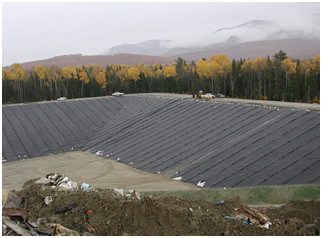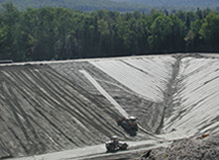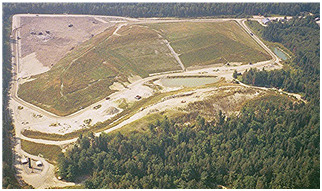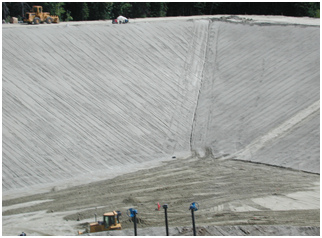 In 1994, Casella Waste Systems, Inc. (Rutland, VT) purchased the Subtitle D landfill on Trudeau Road in Bethlehem. Casella is a vertically integrated waste management company with annual revenues of over $500 million per year. Principal shareholders are brothers John and Doug Casella, who founded the company in 1975; together they control a large percentage of voting shares. The Casella brothers' environmental record is frightening, and includes the contamination of a horse farm by a Casella landfill in Whitehall, NY, as well as a large environmental fine for violations at their Newbury Vermont landfill (since closed), violations for accepting unauthorized waste at a Pennsylvania transfer station (and lying about the tonnage accepted), allegations of dumping medical waste in Woburn, MA (which the MA DEP refuses to fully investigate), hazardous waste violations in Bethlehem -- the list goes on and on. In 1994, Casella Waste Systems, Inc. (Rutland, VT) purchased the Subtitle D landfill on Trudeau Road in Bethlehem. Casella is a vertically integrated waste management company with annual revenues of over $500 million per year. Principal shareholders are brothers John and Doug Casella, who founded the company in 1975; together they control a large percentage of voting shares. The Casella brothers' environmental record is frightening, and includes the contamination of a horse farm by a Casella landfill in Whitehall, NY, as well as a large environmental fine for violations at their Newbury Vermont landfill (since closed), violations for accepting unauthorized waste at a Pennsylvania transfer station (and lying about the tonnage accepted), allegations of dumping medical waste in Woburn, MA (which the MA DEP refuses to fully investigate), hazardous waste violations in Bethlehem -- the list goes on and on.
 The Casella subsidiary in Bethlehem is called North Country Environmental Services (NCES). The landfill employs only 5 people at their Bethlehem operation, has filed for tax-exempt status as a "Pollution abatement facility" to avoid paying town property taxes, pays no host community fees, charges the Town MORE than other local communities to accept their trash, and has continued to expand its operation in spite of SIX losses at the polling booth by the hands of Bethlehem voters determined to uphold their local zoning ordinance which prevents the expansion of landfills. The Casella subsidiary in Bethlehem is called North Country Environmental Services (NCES). The landfill employs only 5 people at their Bethlehem operation, has filed for tax-exempt status as a "Pollution abatement facility" to avoid paying town property taxes, pays no host community fees, charges the Town MORE than other local communities to accept their trash, and has continued to expand its operation in spite of SIX losses at the polling booth by the hands of Bethlehem voters determined to uphold their local zoning ordinance which prevents the expansion of landfills.
In 2001, the entire situation came to a head at the New Hampshire Supreme Court. A lower court had ruled that Casella possesses local approval to landfill two of their three contiguous parcels: a ten-acre piece, and a 41-acre piece, but NOT a 36-acre piece. The Town had appealed the ruling, arguing that local boards had restricted the acreage. Casella cross-appealed, arguing that they SHOULD be allowed to use the 36-acre parcel as well. In May, 2001, the NH Supreme Court upheld the lower court decision, and the boundaries were drawn: 51 acres, and no more. However, once setbacks, scales, and buildings were taken into account, there is very little space remaining on the 51 acres.
 In 2001, the Town hired a new attorney who has much more experience in municipal law. September 12, 2001, when the rest of the world had more important things on their minds, Casella filed another suit (NCES II) against the Town alleging bad faith by Town boards, illegality of zoning ordinances, and that under RSA 149 M DES permits preempt local approval ~ i.e. that NH towns have NO SAY in zoning where solid waste facilities are concerned. The hearing was held in December 2002. The Judge Burling's May 27, 2003 judgment found no bad faith, upheld the legality of the 1992 zoning ordinance and ruled that RSA 149 M includes local control. In 2001, the Town hired a new attorney who has much more experience in municipal law. September 12, 2001, when the rest of the world had more important things on their minds, Casella filed another suit (NCES II) against the Town alleging bad faith by Town boards, illegality of zoning ordinances, and that under RSA 149 M DES permits preempt local approval ~ i.e. that NH towns have NO SAY in zoning where solid waste facilities are concerned. The hearing was held in December 2002. The Judge Burling's May 27, 2003 judgment found no bad faith, upheld the legality of the 1992 zoning ordinance and ruled that RSA 149 M includes local control.
Casella took what it hadn't been given anyway. Just months after filing suit against the Town, in 2002, Casella applied to NH Department of Environmental Services (DES) for a NEW 12-acre cell, this one primarily located within the 36-acre parcel that the Supreme Court had ruled had NO local approval, and that is currently being litigated. Without batting an eye, DES, which many in town cynically call "A Division of Casella Waste Systems", started fast tracking the application through the approval process, effectively ignoring the Supreme Court decision. Meanwhile, DES is considering whether to grant tax exemption to the landfill as a "Pollution Abatement Facility", a rather ridiculous assertion when one considers that the aquifer was NOT polluted prior to the landfill being there. And here we now stand.
At issue is the right of towns to operate their own municipal landfill, while limiting the size and location of a private profitable landfill through local zoning ordinances, -- especially small towns in low-income areas. If Casella wins this case, any town with a municipal landfill will not be able to control the waste industry from locating a landfill or incinerator in their community, perhaps with tax-exempt status. New Hampshire will become the most desirable state in the country for the waste industry. Considering the recent closure of New York City's landfill that is indeed troubling.
Environmental Action
for Northern New Hampshire
PO Box 268
Bethlehem, NH 03574
|


 EANNH estimates that the landfill operation in Bethlehem grosses over $10 million a year (based on company statements that 140,000 tons per year are accepted; current tipping fee for municipal solid waste is $70 per ton). An operation of this size is a tempting potential source of cash for the Town. However, over the years residents have come to see the landfill as an objectionable neighbor. In the past, landfill operators have consistently expanded against the wishes of the Town, underfunded the closure trust fund and disregarded environmental testing. The landfill issue has divided townspeople, cost the Town enormous litigation fees and is incongruous with the Town's vision of itself as a hospitality and recreation area, a tradition deeply ingrained in the Town's history.
EANNH estimates that the landfill operation in Bethlehem grosses over $10 million a year (based on company statements that 140,000 tons per year are accepted; current tipping fee for municipal solid waste is $70 per ton). An operation of this size is a tempting potential source of cash for the Town. However, over the years residents have come to see the landfill as an objectionable neighbor. In the past, landfill operators have consistently expanded against the wishes of the Town, underfunded the closure trust fund and disregarded environmental testing. The landfill issue has divided townspeople, cost the Town enormous litigation fees and is incongruous with the Town's vision of itself as a hospitality and recreation area, a tradition deeply ingrained in the Town's history. In 1994, Casella Waste Systems, Inc. (Rutland, VT) purchased the Subtitle D landfill on Trudeau Road in Bethlehem. Casella is a vertically integrated waste management company with annual revenues of over $500 million per year. Principal shareholders are brothers John and Doug Casella, who founded the company in 1975; together they control a large percentage of voting shares. The Casella brothers' environmental record is frightening, and includes the contamination of a horse farm by a Casella landfill in Whitehall, NY, as well as a large environmental fine for violations at their Newbury Vermont landfill (since closed), violations for accepting unauthorized waste at a Pennsylvania transfer station (and lying about the tonnage accepted), allegations of dumping medical waste in Woburn, MA (which the MA DEP refuses to fully investigate), hazardous waste violations in Bethlehem -- the list goes on and on.
In 1994, Casella Waste Systems, Inc. (Rutland, VT) purchased the Subtitle D landfill on Trudeau Road in Bethlehem. Casella is a vertically integrated waste management company with annual revenues of over $500 million per year. Principal shareholders are brothers John and Doug Casella, who founded the company in 1975; together they control a large percentage of voting shares. The Casella brothers' environmental record is frightening, and includes the contamination of a horse farm by a Casella landfill in Whitehall, NY, as well as a large environmental fine for violations at their Newbury Vermont landfill (since closed), violations for accepting unauthorized waste at a Pennsylvania transfer station (and lying about the tonnage accepted), allegations of dumping medical waste in Woburn, MA (which the MA DEP refuses to fully investigate), hazardous waste violations in Bethlehem -- the list goes on and on. The Casella subsidiary in Bethlehem is called North Country Environmental Services (NCES). The landfill employs only 5 people at their Bethlehem operation, has filed for tax-exempt status as a "Pollution abatement facility" to avoid paying town property taxes, pays no host community fees, charges the Town MORE than other local communities to accept their trash, and has continued to expand its operation in spite of SIX losses at the polling booth by the hands of Bethlehem voters determined to uphold their local zoning ordinance which prevents the expansion of landfills.
The Casella subsidiary in Bethlehem is called North Country Environmental Services (NCES). The landfill employs only 5 people at their Bethlehem operation, has filed for tax-exempt status as a "Pollution abatement facility" to avoid paying town property taxes, pays no host community fees, charges the Town MORE than other local communities to accept their trash, and has continued to expand its operation in spite of SIX losses at the polling booth by the hands of Bethlehem voters determined to uphold their local zoning ordinance which prevents the expansion of landfills. In 2001, the Town hired a new attorney who has much more experience in municipal law. September 12, 2001, when the rest of the world had more important things on their minds, Casella filed another suit (NCES II) against the Town alleging bad faith by Town boards, illegality of zoning ordinances, and that under RSA 149 M DES permits preempt local approval ~ i.e. that NH towns have NO SAY in zoning where solid waste facilities are concerned. The hearing was held in December 2002. The Judge Burling's May 27, 2003 judgment found no bad faith, upheld the legality of the 1992 zoning ordinance and ruled that RSA 149 M includes local control.
In 2001, the Town hired a new attorney who has much more experience in municipal law. September 12, 2001, when the rest of the world had more important things on their minds, Casella filed another suit (NCES II) against the Town alleging bad faith by Town boards, illegality of zoning ordinances, and that under RSA 149 M DES permits preempt local approval ~ i.e. that NH towns have NO SAY in zoning where solid waste facilities are concerned. The hearing was held in December 2002. The Judge Burling's May 27, 2003 judgment found no bad faith, upheld the legality of the 1992 zoning ordinance and ruled that RSA 149 M includes local control.